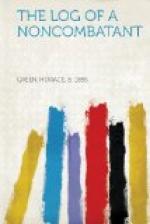I stopped at the American Consul’s office on the Place de Meir, only to find the place was locked. A frightened face behind the grating told me that the consul had taken his wife to the country—good place to be in, I thought.
Things began to seem lonely. I heard shells falling and saw flames in the southern quarter of the city, and decided to go in that direction to look up an American correspondent and two photographers who had asked me to bunk with them in the cellar of a little abandoned house at 74 Rue de Peage.
Turning down a little side street leading toward the Boulevard de Leopold, I was greeted by a clap of thunder overhead. A shell demolished a house across the street and about thirty yards down. The concussion knocked over a couple of babies. I picked them up, put them back in the doorway of the house where they seemed to belong, saying over and over again mechanically, “There, there, don’t cry. There is nothing to be frightened about”; and then, just to show how little I myself was frightened I began to run. I ran for all I was worth. I ran right into the fire. The shells were falling fairly thick on the Boulevard de Leopold; every two or three hundred yards a house was partially destroyed; bricks and glass littered the pavement, and occasionally, every quarter of a mile or so, I saw a figure skulking along under the eaves of a building, crouching and ducking in time to the nasty music of the shells. But I decided that the middle of the street was the safest part.
When I had gone about a quarter of a mile I got my nerve again. I put my hands in my pockets, lighted a cigarette, and was just saying to myself, “This is pretty good fun, after all,” when crash!! Crash!! two, or possibly three, shells, bursting in rapid succession, tore down houses a hundred yards ahead of me. Then one struck in the street, and jagged fragments of angry shrapnel skidded along the pavement like a thrown stone skipping along the surface of the water. I was again trembling all over.
Was the game worth the candle, I asked myself. “I’ve come three thousand miles and overcome every obstacle just to get into this horrible mess. If I get disfigured—no, I’d much rather be killed—will it—”
“Crash!! Bang!!” went a monster shell as I turned the corner.
Two doors from the corner of a narrow street covered with bricks and mortar fluttered a United States flag, and beneath it the door of 74 Rue de Peage. This place was later spoken of as “Thompson’s fort,” because Donald C. Thompson, a Kansas photographer, took possession of it after the Belgian family fled, and plundered the neighborhood for coffee, rolls, and meat, with which he stocked his little cellar. The house next door had already been struck, and shattered glass littered the pavement. The doorstep of 74 was covered by a couple of mattresses and sand-bags. Beneath this, in a dingy sort of coal-bin, heaped with straw, I found crouching the tenants of “Thompson’s fort.”




